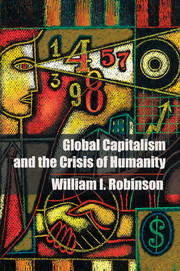6 - Conclusions
Interregnum – A New Crisis of Hegemony
Published online by Cambridge University Press: 05 August 2014
Summary
It is easier to imagine the end of the world than it is to imagine the end of capitalism.
Frederic Jameson, 2003We do not attempt dogmatically to prefigure the future, but want to find the new world only through criticism of the old. But if the designing of the future and the proclamation of ready-made solutions for all time is not our affair, then we realize all the more clearly what we have to accomplish in the present – I am speaking of a ruthless criticism of everything existing, ruthless in two senses: The criticism must not be afraid of its own conclusions, nor of the conflict with the powers that be.
Karl MarxIn 2003 I co-organized a conference in Santa Barbara, California, titled Towards a Critical Globalization Studies. The conclave brought together some 100 leading scholars worldwide on globalization with leading activists and intellectuals from the global justice movement. Our objective was to explore what a critical study of global society involves and how such a study is related to struggles for social justice around the world. I argued that there is no such thing as free-floating academics and that all intellectual labor is organic in the sense that studying the world is itself a social act, committed by agents with a definite relationship to the social order. Intellectuals who consider themselves revolutionaries should have as their task analyzing the system of global capitalism, I continued, exposing its myths and lies, unmasking its legitimating discourses and ideologies, and identifying the forces that benefit from the continuation of this system. If we are to contribute to movements for social justice through our intellectual labor, then we should seek to aid those directly organizing mass struggles around the world to transform this system by applying our training and experience to elucidating the real inner workings of the social order and the contradictions therein. Central to this undertaking is putting forward a cogent and systematic critique of global capitalism. For her part, the scholar-activist Susan George cautioned at the Santa Barbara conference that academics who wish to be relevant should study the rich and powerful, not the poor and powerless.
- Type
- Chapter
- Information
- Global Capitalism and the Crisis of Humanity , pp. 214 - 238Publisher: Cambridge University PressPrint publication year: 2014

